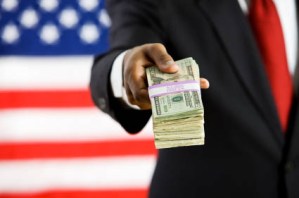 Venture capitalists looking for clean energy investments say that the billions in stimulus grants, tax credits and loan guarantees distributed by the U.S. government, particularly the Department of Energy, have taken a lot of risk out of investing in early-stage startups. While VCs remain skittish following 2008’s economic downturn, this money could go along way toward establishing big companies in solar, wind, and other renewable industries.
Venture capitalists looking for clean energy investments say that the billions in stimulus grants, tax credits and loan guarantees distributed by the U.S. government, particularly the Department of Energy, have taken a lot of risk out of investing in early-stage startups. While VCs remain skittish following 2008’s economic downturn, this money could go along way toward establishing big companies in solar, wind, and other renewable industries.
“We have a new partners, and that’s the Department of Energy,” said Bruce Pasternack, a venture partner at CMEA Capital during the SDForum’s “State of Clean Energy: Global Challenges and Opportunities” conference hosted today at AMD’s campus in Sunnyvale.
The American Recovery and Reinvestment Act, better known as the stimulus package, passed during the early weeks of the Barack Obama administration, earmarked $36.7 billion for energy-related investments, according to the Energy Department. Solar, wind, and the Smart Grid have been the major beneficiaries of these programs so far. Biofuel, battery and experimental carbon capture projects have also received healthy amounts of financing.
The government money has proved especially vital in the cleantech sector, where the majority of projects, like power plants, wind farms and fuel refineries, are extremely capital intensive. The stimulus funds have made much more money available for startups and private companies than they could ever cull from private investors. At today’s event, Robert Walker, a principal at Sierra Ventures, estimated the amount of money venture capital firms have invested in clean technology companies to be less than $10 billion.
AI Weekly
The must-read newsletter for AI and Big Data industry written by Khari Johnson, Kyle Wiggers, and Seth Colaner.
Included with VentureBeat Insider and VentureBeat VIP memberships.
“The amount of money the federal government has swamps anything we’re doing,” Walker said. “It’s huge.” At the same time, though, it’s unclear how long this federal largess will continue, he added. A venture capital firm may invest in a company for five to seven years — grants and other incentives from the government could easily be changed or discontinued during this time.
“I don’t know who the president is going to be in five to seven years,” Walker said, to this point.
Asked if federal funding mitigates risk for venture capitalists who have shied away from more far-fetched opportunities, Dylan Steeg, a director at Intel Capital, said, “It’s just another variable,” among all of the variables VCs consider when assessing the advantage of one investment over another. “The impact of the federal stimulus remains to be seen in the long-term.”
CMEA’s Pasternack, who has worked with the federal government on energy issues since the mid-1970s, said he is impressed with the caliber of the people making financing decisions in the Department of Energy.
“They have a DOE team there who have a real deep expertise in the technology, and that gives me hope,” he said.
VentureBeat's mission is to be a digital town square for technical decision-makers to gain knowledge about transformative enterprise technology and transact. Learn More